Monday, September 23, 2024
Monday, September 23, 2024


Video, 1 hr & 6 mins
This video is a recording of the presentation I gave in Middle Tennessee State University’s Applied Philosophy Lyceum speakers series on November 17, 2023, in Murfreesboro, TN.
The talk is titled, “Freedom in Education: A Philosophical Critique of Current Educational Policies,” and the abstract for the presentation reads as follows:
Parents and guardians are naturally concerned about what their children are taught in schools. Some lament what they feel is a lack of control over curricula and what are thought to be forces or agendas that they believe are not in kids’ best interests. The arguments advanced in recent conflicts take two main forms. The first, advanced in similar fashion on opposing sides of issues concerning gender and early education, takes the form of arguments to “protect” children. The second, typically arising in discourse about desire for exclusion or selection of curricular messages or content, typically focuses on parents’ rights, in particular, to freedom of choice, whether regarding selection of schools, book banning, or inclusion or exclusion of desired or undesirable subject matters from curricula. In this talk, Dr. Weber will defend the importance of students’ and teachers’ freedom and challenge the overreach of dominant parental views that seek to silence the lived experiences and concerns of marginalized groups.
NOTE: At one point, I accidentally said “Transylvania State University,” which was intended to refer to Transylvania University, which is a private institution. This was an accidental case of misspeaking. The point was to contrast with state institutions, which was on my mind, and probably led me to use that word, “state,” resulting in the opposite of my intended meaning… My mistake!
Philosophical Research Methods: This talk was delivered in fall 2023, when I was teaching a course on Philosophical Research Methods in the University of Kentucky’s College of Education. I mention this because in this talk, I describe my methodology explicitly for the project beginning at minute 14 until minute 19. For those interested in that portion of the talk, you can jump to those minutes.
Thanks again! I am most grateful to Dr. Phil Oliver for organizing a wonderfully welcoming event, which featured a great turn out on a rainy Friday evening. I’m also grateful to the members of the MTSU department of Philosophy and Religion, as well as to Heather Gibbs, who kindly coordinated the details of my visit.
In the spring of 2023, the Ethics and Social Justice Center at Bellarmine University issued a call for proposals for their yearly Commonwealth Ethics Lecture. They invited scholars from around the state to propose a talk to be delivered for their 2023 lecture, considering approaches from all disciplines and with special interest in interdisciplinary dialogue and topics, encouraging “critical reflection, dialogue, and constructive action on contemporary ethical issues in society.” They also welcomed proposals “related to politics, societal well-being, and individual happiness,” as well as that “intersect these themes with regional issues.”
I pitched my proposal in relation to the fact that Kentucky is a state that continues to permit and make use of corporal punishment in public schools. I have long thought about corporal punishment especially as an example of a practice long outmoded and for which evidence has become increasingly clear that better alternatives are available and that long-term effects of the practice are psychologically and medically discouraged. Given this opportunity, it was a great chance for me to focus on corporal punishment directly, so I jumped at the chance finally to focus extensively on this topic.
Kentucky has decreased the use of the form of discipline in public schools to nearly negligible levels, with 17 recorded instances of corporal punishment in the 2020-2021 school year, which suggests that the practice would not be difficult to end at the state level. Given that, Kentucky could serve as a leader among states that presently permit and engage in the practice, to show how others can follow the lead of the Commonwealth state of Kentucky, to end the practice around the country. The video here above is 1hr and 1 min long, concluding at the end of my talk, not including the question and answer session, though that was fun and rewarding for me also.
I am especially grateful to Dr. Kate Johnson for being a welcoming and great host at Bellarmine University for the talk. The attendance and recording of the talk were great and much appreciated.
The PowerPoint slides for my talk are available online here.
VIDEO: Freedom in Education for Diversity of Flourishing
This video was recorded at Vanderbilt University on October 15th, 2022, at the John and Shirley Lachs Conference on American Philosophy. My presentation was titled “Freedom in Education for Diversity of Flourishing.” Here’s the program for the conference. I am grateful to Vanderbilt University’s Philosophy Department for support for my participation in the conference and for permission to post the video.
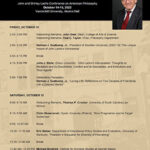
| Date: | October 14, 2022—October 15, 2022 |
|---|---|
| Event: | John and Shirley Lachs Conference on American Philosophy |
| Topic: | "Freedom in Education for Diversity of Flourishing" |
| Sponsor: | Vanderbilt University |
| Venue: | Alumni Hall |
| Location: | Nashville, TN |
| Public: | Public |
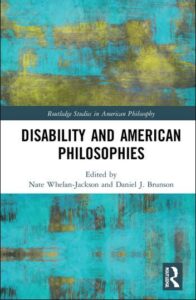
WARNING: At least for me, rereading this paper inspired an emotional response. The stoicism called for in the paper is intended to help ease emotional reactions, but the fact of such a need for some readers (and others have let me know that they have shared such a reaction) is itself worth noting in advance.
We think of the norms I have mentioned as cultural. Philosopher John Dewey saw philosophy as the critique of culture, essentially as thinking about thinking. How we think plays a powerful role in how we treat people and how we educate ourselves and others. In this context, this paper examines one of the difficult contexts for education and the raising of children. And, I offer my own and my family’s experience for consideration, bringing philosophical ideas to bear on tough moments, decisions, and questions.
I first presented a draft of this essay at the annual meeting of the eastern division of the American Philosophical Association in January of 2019. It has just now been published in Disability and American Philosophies, edited by Nate Whelan-Jackson and Daniel J. Brunson in January of 2022 with Routledge Press of London.
It may be worth noting that in 2019 I was still married, something no longer true now, in 2022, when the essay has finally been released in print.
I agreed to publish this article with the understanding that I would have permission to share the essay in this way. You can download a copy of the essay in PDF format here or by clicking on the Adobe image above in this post.
Last, but not least, I have generated a computer-created text-to-speech recording of the essay. If I had more time, I would record myself reading the essay. The following recording took me only a few minutes to generate, by contrast to over an hour or more of work to record it myself. For the sake of accessibility, and at a friend’s request, I generated this audio file, which can be listed to if that is preferred over reading the text. I did not include the notes or bibliography section in the audio file.
Citation: Weber, Eric Thomas, “Stoic Pragmatism for Parenting a Child with Disabilities: An Essay Addressing Philosophers, Parents, Teachers, and Educational Policymakers,” Chapter 11 in Disability and American Philosophies, Edited by Nate Whelan-Jackson and Daniel J. Brunson (London: Routledge, 2022), 182-198.
Graduate students and advanced undergraduates at the University of Kentucky, watch this VIDEO (4m29s) about why you should take my EPE 525 / 640 course in the fall of of this year on the Philosophy of Education. The EPE 525 course is the undergraduate version of the EPE 640 class, which is for graduate students, and both meet at the same time and in the same room.
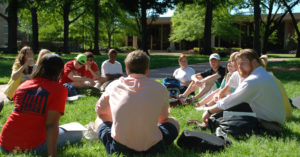
b) All research is rooted in frameworks of ideas that support and contextualize our work and thought, and that can clarify and help us to focus or be conflicted and confuse us if not carefully considered;
c) Everyone working in educational administration contributes to a system that functions with respect to or in conflict with underlying philosophical ideas. That calls for appreciating and always keeping in mind what we ought to be doing in education.
1) A short “teaching statement,” “Statement on Educational Philosophy,” or related document commonly requested in academic job applications, as well as for administrative positions that often involve teaching courses or otherwise supporting them;
2) A book review for possible publication (optional route for students’ presentation);
3) A conference-length paper ready for submission to professional calls for papers;
4) A full-length research paper suitable for submission to journals and that could support your other projects;5) An op-ed-length version of the research paper for possible submission to newspapers or educational periodicals (optional);
6) Credits that can contribute to the Graduate Certificate in College Teaching and Learning.
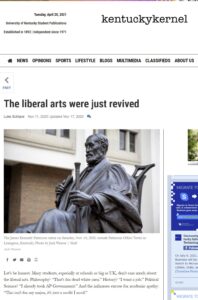
From the Fall of 2020, 5 students, including one undergraduate, had their papers accepted for presentation at the 2021 Southeastern Philosophy of Education Society conference. Two more students have had their book reviews accepted for publication in the journal Essays in Philosophy. One published his op-ed in the Kentucky Kernel. All wrote fascinating statements on teaching philosophy.
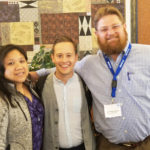
Questions? Email me at eric.t.weber@uky.edu. You can also connect with me on Facebook, Twitter, LinkedIn, & Academia.edu.
Today, I led a discussion for the department of Educational Policy Studies and Evaluation’s Lunch & Connect series, which we run to keep people connected despite the pandemic. My meeting was titled: “Prepare to Act Naturally! … Or, Be Nice, Not Machiavellian, in Professional Networking.”
For the talk, I created a handout, which is available here: etw.li/networking.
We recorded today’s talk, which you can watch here:
If you enjoyed this video, consider sharing it with anyone looking for thoughts about professional networking in higher education.
In the video, Dr. Kelly Bradley mentioned a resource that I may get ahold of and be able to share with you here, updating this post.

The EPE department’s Lunch & Connect series is meant to help us stay in touch with each other during the time of COVID-19. Today, October 16th, was the day for which I signed up and weeks ago I had reached out to graduate students who participate in the Agraphia writing meeting that I run weekly, to ask what they’d like to hear about. This was one of the options that I had thrown out and that received the most votes.
While the subtitle of my talk reads “From Idea to Presentation, to Journal Article, to Book,” actually it all starts before those smaller matters, with the big picture of one’s aims and career research trajectory. By “career,” I don’t particularly mean to refer to employment, but to the life of one’s research aims. Connecting to the big picture in this way and to who each researcher is represents an outgrowth of John Dewey’s philosophy of education, which calls for recognizing persons’ varied inclinations, interests, and selectivity of attention, as well as their powers, abilities, and attitudes. The big picture need not lead a person to exclude all else, but can allow healthy breaks for divergent projects, while also giving us reasons to watch out for what we often call “rabbit holes.”
I wouldn’t be surprised if I were to give this talk again. If I do so, I’ll be sure to record it. For now, at least, I can share the handout I made for the sake of facilitating today’s meeting. I hope it’s useful.
P.S. If you are interested in studying philosophical issues in education, check out the Philosophical and Cultural Inquiry (PCI) track of the University of Kentucky College of Education’s Ph.D. in Educational Sciences. There aren’t many programs like ours in the country. If you want to learn more, reach out: eric.t.weber@uky.edu.

Students in EPE 301 can use this video as 1 hour of their field experience observations. The dangers of COVID-19 prompted the creation of this option. Most students are probably not studying the subject of this talk for their papers, but all are working on research in their undergraduate coursework. In that context, students might find the content of this video useful for taking their work beyond the classroom. In addition, students interested in an issue about which they suspect that I could offer some useful thoughts can email me with their questions or comments as part of their field experience work: eric.t.weber@uky.edu.
In the talk, I reference three texts that aren’t mentioned on the handout. Those books were:
Allen, David. Getting Things Done: The Art of Stress-Free Productivity (New York: Penguin Books, 2015).
Brewer, Robert Lee. Writer’s Market 2020 (New York: Penguin Random House, 2019).
Brewer, Robert Lee. Writer’s Market Guide to Literary Agents 2020 (New York: Penguin Random House, 2019).
Listen to the interview here:
This episode of “Behind the Blue” spotlights one of the six Great Teacher Award winners for 2024. Eric Thomas Weber is an associate professor in the UK Department of Educational Policy Studies and Evaluation in the College of Education. He specializes in the philosophy of education, ethics and public policy, political philosophy and American philosophy.
In addition to teaching at the undergraduate and graduate levels, Weber is co-chair of the faculty and student recognition committee for the College of Education and has served as a member of the Lewis Honors College’s faculty council.
Weber received his bachelor’s degree from Vanderbilt University with a double major in philosophy and communication studies; his master’s in philosophy from Ohio University and his Ph.D. in philosophy from Southern Illinois University. He joined the UK faculty in 2016 as a visiting associate professor in the Department of Philosophy and then in 2018 as an associate professor of educational policy studies and evaluation in the College of Education. His published academic work consists of five books, 36 articles or essays, 56 popular media publications and 151 presentations.
“Behind the Blue” is available on iTunes, Google Play, Stitcher and Spotify. Become a subscriber to receive new episodes of “Behind the Blue” each week. UK’s latest medical breakthroughs, research, artists and writers will be featured, along with the most important news impacting the university.
For questions or comments about this or any other episode of “Behind the Blue,” email BehindTheBlue@uky.edu or tweet your question with #BehindTheBlue. Transcripts for this or other episodes of “Behind the Blue” can be downloaded from the show’s blog page.